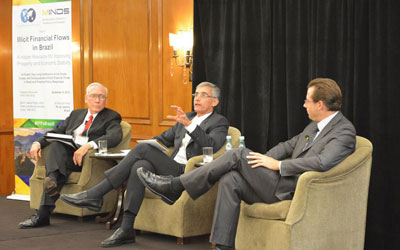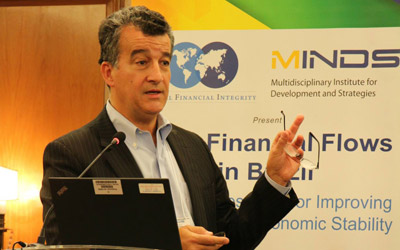
With Election Over, Will Brazil Turn to Curbing Its Illicit Flows Problem?
By Christine Clough, PMP, November 13, 2014

A Recent GFI Study & Conference Focused on Brazil’s Illicit Financial Flows, which Cost the Latin American Country US$401.6 Billion from 1960-2012
A pair of articles by The Economist last week highlight the economic challenges that Brazil’s recently re-elected president, Dilma Rouseff, will face in her second term leading Latin America’s largest economy. The federal budget shortfall has grown to 4.9% of GDP. Tax increases could further undermine growth, and cuts to benefits programs for Brazilians might also decrease spending and slow the economy, in addition to weakening progress on addressing the country’s economic inequality and poverty rates.
Many Brazilians already complain about the high tax rates and poor public services. According to a Christian Science Monitor article, which cites the Brazilian Institute of Tax Planning:
“the average person works 150 days a year to pay taxes, compared with 102 days in the [United States]. Among the 30 countries with the highest tax burdens, Brazil ranks last in terms of the quality of services citizens receive in exchange for high taxes.”
Businesses and individuals in Brazil are also dealing with high inflation, slow growth, a weakening currency, and a growing current-account gap.
Curtailing Illicit Financial Flows
How does President Rouseff plan to address these challenges? That’s very unclear so far, and, presumably, she and her team are working hard to put together a new strategy.
Curtailing illicit financial flows, especially those resulting from trade misinvoicing, by improving financial transparency should be on President Rouseff’s priority list. Global Financial Integrity released a special report on Brazil’s illicit flows in September that revealed that “[o]utflows of illicit capital totaled US$401.6 billion from 1960 through 2012.” Furthermore, the rate of outflows has increased significantly since 2000. Average annual outflows were US$14.7 billion from 2000-2009 and US$33.7 billion from 2010-2012, the latest year for which data was available.
These outflows represent losses to Brazil in four important ways.
- First, the Government of Brazil loses a percentage of the flows that would otherwise have been collected as VAT and other personal and commercial taxes.
- Second, the economy of Brazil loses investment resources approximately equal to the outflow minus taxes.
- Third, trade misinvoicing—specifically under-reporting exports and over-reporting imports—may be partly responsible for fueling Brazil’s growing current-account gap.
- Fourth, these outflows facilitate grand-scale crime and corruption and exacerbate economic inequality.
September Conference Focused Attention on Brazil’s Illicit Flows
GFI and the Multidisciplinary Institute for Development and Strategies (MINDS) co-hosted a day-long conference in Rio de Janeiro on September 9 that presented the report’s findings and brought in a group of experts to talk about the consequences of these illicit outflows for Brazil and how the government might go about beginning to tackle them.
GFI President Raymond Baker and Paulo Wrobel of the BRICS Policy Center presented the findings of the report and discussed the issue of illicit financial flows within the context of the BRICS.

Raymond Baker, Leonardo Burlamaqui, and Matt Woods (Left to Right) on a panel at GFI’s conference in Rio de Janeiro on September 9, 2014. Image: Clark Gascoigne/GFI
Olav Lundstøl, Counselor–Energy and Petroleum at the Royal Norwegian Embassy, Leonardo Burlamaqui, Professor of Economics at the State University of Rio de Janeiro, and Roberto Fendt, Executive Director of the Brazilian Center for International Relations (CEBRI), shared their experiences and expertise on how illicit outflows have undermined growth and development and increased inequality in Brazil, and in other developing countries.
Matt Woods, Deputy Consul-General and Head of UK Trade and Investment in Rio de Janeiro for the British Consulate General, Leonardo Burlamaqui, and GFI President Raymond Baker presented on how increasing financial transparency through policies such as automatic cross-border exchange of tax information and public registries of beneficial ownership information for all legal entities, in particular, can arm the Government and people of Brazil with the resources they need to curtail these illicit outflows. The speakers also highlighted the existing efforts by some countries and international forums, particularly the UK on beneficial ownership and the OECD on automatic information exchange, that are getting closer to implementing some of these policies.

Rogério Studart, Alternate Executive Director for Brazil, Colombia, Dominican Republic, Ecuador, Haiti, Panama, the Philippines, Suriname, and Trinidad & Tobago at the World Bank, delivers the keynote address at GFI’s conference in Rio de Janeiro on September 9, 2014. Image: Christine Clough/GFI
In his keynote address, Rogério Studart, the Alternate Executive Director for Brazil, Colombia, Dominican Republic, Ecuador, Haiti, Panama, the Philippines, Suriname, and Trinidad & Tobago at the World Bank—himself Brazilian—noted that while illicit financial flows were not a problem unique to Brazil, they were a matter of extreme concern, particularly for their effect on facilitating tax evasion and draining the country’s international reserves. He warned that curbing illicit flows needed to be handled both domestically as well as globally, particularly at multilateral bodies.
There is a large and growing recognition of the seriousness of the illicit flows challenge facing Brazil and that financial transparency is a major part of the solution. Brazil is a spectacular country, and its people deserve a better economy. Curtailing illicit outflows is one of the keys to putting the economy back on track.
Resources
- GFI’s report, “Brazil: Capital Flight, Illicit Flows, and Macroeconomic Crises, 1960-2012”, can be found on our website here.
- All conference materials, including the agenda, PowerPoint presentations, photographs, and videos of each speech and panel are available on the conference event page here.
- Videos of the entire conference can also be viewed in both English and Portuguese below:
[wptab name=’English Videos’]
The playlist above cycles through all six English videos from the event. To choose a specific panel or speech to watch, select the “Playlist” menu drop-down in the top left corner of the video frame, and then click on the video of your choosing.
[/wptab]
[wptab name=’Portuguese Videos’]
The playlist above cycles through all six Portuguese videos from the event in chronological order. To choose a specific panel or speech to watch, select the “Playlist” menu drop-down in the top left corner of the video frame, and then click on the video of your choosing.
[/wptab]
[end_wptabset skin=”default” location=”top” ]
